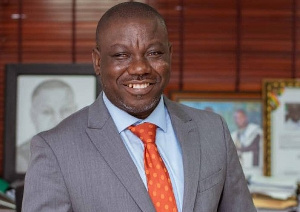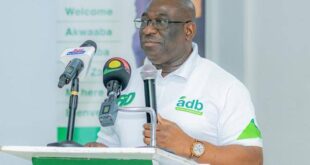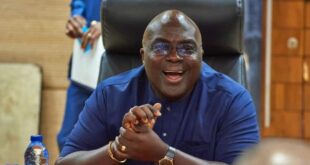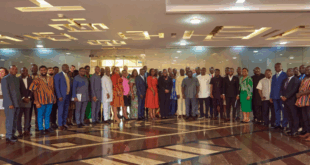His comments come following a downgrade of two of Ghana’s biggest banks; GCB Plc and Ecobank Ghana Limited by rating agencies Moody’s and Fitch.
Fitch Ratings assigned Ecobank Ghana a Long-Term Issuer Default Rating (IDR) of ‘B-‘ with a Negative Outlook and Viability Rating (VR) of ‘b-‘.
According to the agency, the bank “is unlikely to remain solvent in the event of a sovereign default, due to the concentration of its activities within Ghana, its material reliance on sovereign-derived income and high exposure to the sovereign relative to capital, primarily through government securities (447% of common equity Tier 1 (CET1) capital at end-9M21).”
“The Negative Outlook on EGH’s Long-Term IDR mirrors that on Ghana’s Long-Term IDR,” Fitch Ratings stated.
Another bank affected by the downgrade by Fitch Ratings is UBA Ghana.
“Fitch considers that UBA Ghana is unlikely to remain solvent in a sovereign default scenario, due to the concentration of its operations within Ghana, reliance on sovereign-derived income, and high exposure to the sovereign relative to capital – primarily through local-currency government securities,” the statement from Fitch read.
In addition, Moody’s has downgraded GCB Bank PLC’s global long-term deposit ratings to Caa1 from B3 and lowered its Baseline Credit Assessment (BCA) and Adjusted BCA to caa1 from b3.
The outlook on the bank’s long-term deposit ratings has however been changed to stable, from negative.
The action according to Moody’s “follows the weakening of the Ghanaian government’s credit profile, as captured by Moody’s downgrade of the sovereign rating to Caa1 from B3, with a stable outlook, on 04 February 2022”
Commenting on the development, Isaac Adongo argued the huge amount of money sunk into the banking sector clean-up exercise has turned out to be a waste.
“After spending GH¢22 billion to collapse financial institutions, Fitch downgrades your two biggest banks as very risky for investors to put their monies in them. Our banks face a gloomy prospect of correspondent banks running away,” The Bolgatanga Central MP wrote on Facebook.
The legislator pointed out that in 2017, he cautioned the government about a directive for GCB Bank to absorb the then UT Bank and Capital Bank whose licenses have been revoked over insolvency allegations.
Speaking to Starr News, Isaac Adongo attributed the troubles of the local banks to excessive borrowing by the government.
“The rating action on the downgrade of ECOBANK and GCB Bank reflect the worrying impact of excessive exposure to Government which has elevated the risks on their balance sheet,” he stressed
“Unfortunately, since Government took the decision to transfer the obligations of payment of depositors of UT Bank and Capital Bank to GCB Bank, GCB has been drained of its liquidity without any meaningful growth in deposit mobilization. My advice at the time to Government to monetize the resolution bonds to provide funds to GCB Bank to meet its obligations to depositors of UT and Capital Banks were ignored.” he stated.
Isaac Adongo however described the banking sector cleanup exercise as poorly planned and politically motivated to target and collapse some banks and warned other local banks are equally in dire need of support in spite of the amount spent on the exercise.
“It is clear that the rest of the local banks are in dire situations that need urgent support. The fragility of our banks shows the impact of poor planned, politically targeted and predatory regulatory action that wasted GH¢22 billion to bring our banks on their knees,” the MP stated.
Meawnhile, the banking sector clean-up exercise undertaken in 2017 saw the Bank of Ghana revoke licenses of nine (9) banks including: Heritage Bank, Limited, Premium Bank Limited, uniBank, Sovereign bank, BEIGE Bank, Royal Bank, Construction bank, UT Bank and Capital bank.
In addition to this, over 40 other financial institutions were also affected by the clean-up which included some fund management firms.
Source: www.ghanaweb.com
 Home Of Ghana News Ghana News, Entertainment And More
Home Of Ghana News Ghana News, Entertainment And More





